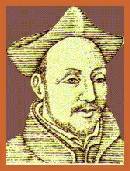|
4.5 The Counter Reformation
An attempt was made to reform the Catholic Church in Italy,
Austria, France and Spain, while the Protestant Reformation was
being carried out in Germany, Switzerland and Scandinavia. The Council
of Trent was convened in 1545 and kept in session for eighteen
years up to 1563, in order to make a better statement of the doctrines
of the Catholic Church and also to carry out useful reforms in money
matters and education. A revision of the service-books of the Church
was carried out, together with an issue of a new edition of the
Vulgate, the Latin Bible. Catholics were prohibited from
reading several dangerous and heretical books which were put down
in a list called the Index. The Church court, known as the
Inquisition, punished lapses from faith, especially those
in Spain and in Italy.
An important role was played by the Society of Jesus, whose members were called the Jesuits, in the new movement for reforms. This was called ’Counter-Reformation’. A Spaniard named Ignatius Loyola (1493-1556) founded the Society of Jesus in 1534. Loyola was a soldier who was wounded and having read about the life of Christ and the biographies of several saints in hospitals, decided to become a spiritual warrior of Christianity. By founding many schools and colleges, through their wide learning and culture and also by their simple and clear sermons and instructions, the Jesuits won back considerable respect for the Catholic Church.

Exhibit 4.3
Ignatius Loyola
In the mission fields they succeeded in reviving Catholicism in Poland which had become Protestant. They saved Catholicism in Belgium, Bavaria, Czechoslovakia and Hungary. They tended to Catholics in England at great risk to their lives. They also undertook missions in India and China among the Indians of North America and among the savages of Brazil and Paraguay, thus making up in numbers what the Catholic Church had lost in northern Europe.
The Pope attempted to maintain Catholicism in Spain,
Portugal, France, Italy and Austria, by entering into treaties or
Concordats with their rulers who were given special privileges in
church matters. The Church thereby became subservient to the kings
and only regained most of its freedom after political and social
revolutions in the 19th
and 20th centuries.
[next page]
|
Index
4.0
Introduction
4.1 Meaning
4.2 Importance of the Reformation
4.3 Causes of the Reformation
4.4 Spread of Protestantism
4.5 The Counter Reformation
4.6 Consequences of the Reformation
4.7 Dates & Events
4.8 Points to Remember
Chapter 5
|